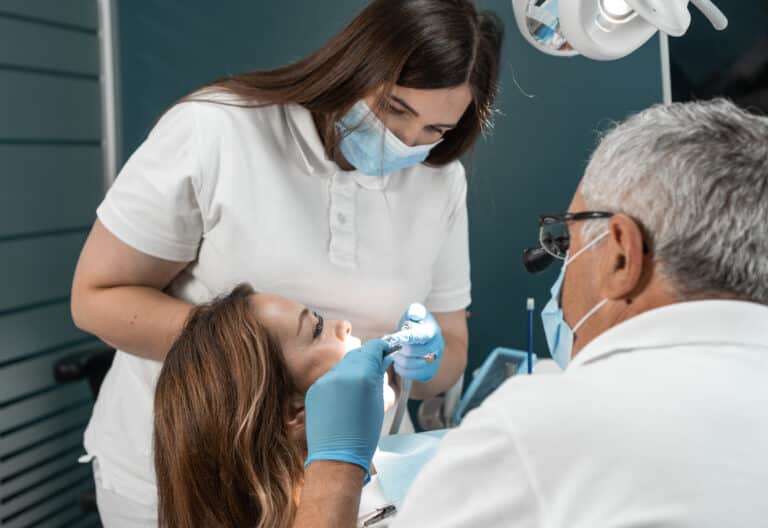If you’re considering a career as a dental assistant, it’s essential to understand the various responsibilities and tasks this role entails. Dental assisting is a profession that requires both clinical and administrative skills, making it a dynamic and fulfilling career. In this article, we’ll explore the top seven duties that a dental assistant is expected to perform, providing a comprehensive overview of what it takes to thrive in this essential healthcare role.
1. Patient Care: The Heart of Dental Assisting
One of the primary duties of a dental assistant is providing patient care. As a liaison between the patient and the dentist, a dental assistant plays a crucial role in ensuring that patients feel comfortable and informed throughout their visit.
Understanding Patient Needs: The first step in patient care is understanding the patient’s concerns and what they seek from their dental visit. Whether it’s a routine check-up or a specific procedure, dental assistants must document the patient’s medical history, take vitals, and explain the procedure they’re about to undergo. This preparation ensures that the dentist has all the necessary information to provide the best care possible.
Alleviating Patient Anxiety: Dental visits can be nerve-wracking for many people. This is where a dental assistant’s interpersonal skills become invaluable. A significant part of the job is making sure patients feel at ease from the moment they step into the clinic until they leave. By offering reassurance and explaining procedures in simple terms, dental assistants can help alleviate patient anxiety, leading to a more positive experience.
2. Preparing the Treatment Room: Behind the Scenes of Successful Procedures
A well-prepared treatment room is essential for the smooth operation of any dental procedure. Dental assistants are responsible for ensuring that the treatment area is ready for the dentist and patient.
Sterilizing Instruments: One of the first tasks in preparing the treatment room is sterilizing dental instruments. This process is critical in preventing infections and ensuring patient safety. Dental assistants must follow strict protocols to ensure that all instruments are properly cleaned and sterilized before each use.
Setting Up Equipment: Beyond sterilizing instruments, dental assistants have also the task of setting up and checking equipment. This includes making sure all necessary tools are available and in working order, creating a sterile workspace, and ensuring that the treatment room meets all safety standards. Proper preparation helps prevent delays and allows the dentist to focus on patient care.
3. Assisting During Dental Procedures: The Dentist’s Right Hand
During dental procedures, the dental assistant plays a key supporting role. This aspect of the job requires attentiveness, dexterity, and a thorough understanding of the procedure at hand.
Supporting the Dentist: As the dentist works, the dental assistant is responsible for passing instruments, managing suction, and providing any other support needed to keep the procedure running smoothly. With experience, dental assistants learn to anticipate the dentist’s needs, which can significantly enhance the efficiency and effectiveness of the procedure.
Patient Safety: In addition to assisting the dentist, dental assistants must also be vigilant about patient safety. This includes appropriate preparation to respond to emergencies and taking proactive steps to address any issues that arise during the procedure. The ability to remain calm and act quickly is crucial in these situations.
4. Sterilization and Infection Control: Ensuring a Safe Environment
Maintaining a clean and sterile environment is a top priority in any dental practice. Dental assistants are at the forefront of infection control, ensuring that both patients and staff are protected from potential health risks.
Following Protocols: Dental assistants must adhere to strict sterilization protocols, which involve disinfecting surfaces, sterilizing instruments, and maintaining the overall cleanliness of the dental facility. This meticulous attention to detail helps prevent the spread of infections and ensures a safe environment for everyone.
Educating Patients and Staff: Beyond their own duties, dental assistants may also be involved in educating patients and other staff members about the importance of infection control. This might include providing instructions on post-procedure care or advising on the proper use of personal protective equipment (PPE).

5. Conducting X-rays: A Crucial Diagnostic Tool
Performing X-rays is another critical responsibility of a dental assistant. X-rays are an essential diagnostic tool that helps dentists assess a patient’s oral health, and dental assistants are trained to operate X-ray equipment effectively.
Positioning the Patient: To obtain high-quality X-rays, dental assistants must ensure that the patient is positioned correctly. This requires knowledge of the equipment and an understanding of how to minimize patient discomfort while capturing the necessary images.
Producing Accurate X-rays: Dental assistants must have skills in producing clear and accurate X-rays. This involves adjusting the equipment, following safety protocols to protect both the patient and themselves from radiation, and ensuring that the images are correctly processed and ready for the dentist’s review.
6. Educating Patients on Oral Health: Promoting Long-term Wellness
A key aspect of dental care is educating patients on how to maintain good oral hygiene and prevent future dental problems. Dental assistants play a significant role in this area by providing patients with the information they need to take care of their teeth and gums.
Oral Hygiene Instructions: Dental assistants often provide patients with instructions on proper brushing and flossing techniques, as well as advice on dietary choices that can impact oral health. This education is particularly important after certain procedures when patients need to follow specific care instructions to ensure a successful recovery.
Answering Questions: Patients often have questions about their oral health, and dental assistants are frequently the first point of contact for these inquiries. Whether it’s explaining the importance of regular check-ups or advising on the best products to use, dental assistants help empower patients to take charge of their oral health.
7. Recordkeeping: Managing Administrative Tasks with Precision
In addition to clinical duties, dental assistants are often responsible for a variety of administrative tasks. These tasks require organizational skills and attention to detail, as they are critical to the smooth operation of the dental practice.
Scheduling Appointments: Dental assistants frequently manage appointment scheduling, ensuring that the clinic’s schedule runs smoothly and efficiently. This includes coordinating with patients, dentists, and other staff members to minimize wait times and avoid scheduling conflicts.
Maintaining Patient Records: Accurate recordkeeping is essential in dental care. Dental assistants are responsible for maintaining and updating patient records, which include medical histories, treatment plans, and billing information. This data must be confidential and organized, as it is crucial for ongoing patient care and legal compliance.
Managing Billing and Insurance: Dental assistants may also handle billing and insurance-related tasks. This involves processing payments, submitting insurance claims, and following up on outstanding payments. A strong understanding of insurance policies and procedures is necessary to manage these tasks effectively.

Dental Assistant: A Multifaceted Role in Healthcare
Becoming a Dental assistant is a multifaceted profession that requires a diverse skill set, combining both clinical and administrative tasks. From providing patient care and preparing treatment rooms to assisting during procedures and managing records, dental assistants play a vital role in the functioning of a dental practice.
For those interested in pursuing this career, it’s important to understand that dental assisting is not just about technical skills. It also requires strong interpersonal abilities, attention to detail, and a commitment to maintaining a clean and safe environment. By mastering these skills, dental assistants can contribute significantly to the health and well-being of their patients, while also enjoying a rewarding and dynamic career in healthcare.
Introducing Preppy’s Dental Assistant Online Training Program

With our fully online dental assistant training program, you could become job-ready faster and more affordably than ever before. Unlike traditional programs that can take up to two years, Preppy lets you earn your dental assistant certification in as little as 4-6 months, all at your own pace, from the comfort of your home. No prior experience is required, and you’ll gain real-world experience through a volunteer externship opportunity with one of our many partners, giving you a competitive edge in the job market. Start towards your exciting and rewarding career as a dental assistant with Preppy today!
Also read: What is a Sterile Processing Technician (SPT)?
About:
Preppy was founded by higher education expert, Grant Aldrich, whose work on college affordability and accessibility has been featured in Forbes, Bloomberg Businessweek, Business Insider, American Express, AOL, MSN, Thrive Global, Reader’s Digest, Inside Higher Ed, Evolllution, EducationDive, and nearly 100 radio shows and podcasts.
Time is money. Instead of programs that could take 2 years, Preppy provides you with education in a few months through immersive online training.
Healthcare, IT, Business, Trades…Preppy gets you ready for the trending careers in our modern economy.
Our team of higher education and startup veterans has created the best solution so everyone can obtain the emerging careers of today and tomorrow.
We look forward to speaking with you. You may also call 800-729-1317.
dental assistant




